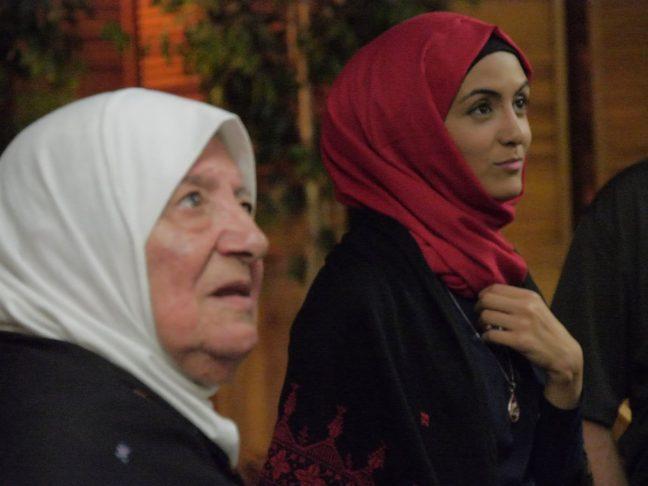Eighty-nine year old Mariam Fathalla held a talk with journalist and translator Amena ElAshkar about her experiences as a Palestinian refugee Monday night.
ElAshkar translated Fathalla’s story, told in Arabic, and later elaborated on her own life and Palestinian history. The talk was a part of their North American Nakba tour, which shares with audiences across the nation stories from Palestinian refugees. Nabka, or “the Catastrophe,” is what Palestinians call the mass expulsion of more than 750,000 of their people from Palestine.
The talk was sponsored by Students for Justice in Palestine and Wisconsin Union Directorate Society and Politics.
Fathalla was 18 years old in 1948 when her village in Palestine was attacked, forcing her to flee. For the past 71 years, she has lived in refugee camps in Lebanon.
At 89, she has witnessed five Israeli invasions of Lebanon and the 1976 Tel al-Zaatar massacre. Tel al-Zaatar, a Lebanese refugee camp, was inhabited by about 20,000 Palestinian refugees and was laid under siege by several thousand Maronite militiamen. When Tel al-Zaatar fell, between 1,000 and 1,500 Palestinians were killed.
The talk began with a video presentation of the refugee camp — Bourj el-Barajneh in Lebanon — ElAshkar grew up in. The video depicted young children growing up in the camp, with one stating that they “live in the camp because they can’t return to Palestine.” The camp houses 50,000 people within its one-third square mile borders, ElAshkar said.
Fathalla grew up in al-Zeeb, Palestine, which was attacked by Israeli forces.
“The village was almost surrounded by the sea, and well-known for its good quality of vegetables and fruits … we had lots of crops and fields,” Fathalla said. “Most men were fishermen.”
As the village grew and found success, Fathalla said its expansion drew it nearer to the neighboring Jewish settlement of Nahariya.
Initially, there were “good relations” between the towns, Fathalla said. Jewish doctors would attend to Palestinians from al-Zeeb late at night and residents of al-Zeeb would shop in Nahariya.
“They used to visit us all the time, and of course we used to visit them all the time,” Fathalla said. “Whenever we had weddings, they used to come over. They used to like our weddings.”
But everything changed when her village became aware villages across Palestine were being attacked. Relations with Nahariya ceased, Fathalla said.
Then, her village’s residents were attacked.
“Once, there were three trucks from our village trying to make their way to Acre and Haifa, as usual,” Fathalla said. “In order to get to Acre and Haifa, they had to pass in front of Nahariya settlement. While they were trying to reach the cities, they were stopped by [an armed] paramilitary checkpoint. They forced all the men inside the trucks to leave the trucks. There were ten men, and they killed all ten men and they burned down the three trucks.”
Two trucks following the initial three heard the bullets, saw the smoke, were able to flee to the village and inform them of what had occurred. The village then called the Red Cross to collect the bodies, Fathalla said.
Ten days later Fathalla’s village was directly attacked. The attack started on the outskirts of the village, where the newer expanded areas were, and then worked its way into the old part of the city, Fathalla said.
The village was later demolished. In December 1948, Yosef Weitz, the director of the Jewish National Fund’s Lands Department, visited al-Zeeb and said that it had been “completely leveled.”
Fathalla said she and many villagers fled to Lebanon, along with refugees from neighboring villages who had also been attacked. After nights of sleeping in schools, mosques or in the streets, they were placed in refugee camps. Conditions were poor at best, she said.
“Whenever it would rain, the dirt [under their tents] would turn to mud and we would sink, and sometimes the tents would just fly away because of the wind during winter,” Fathalla said.
Small tents would be shared by two families of four or five, and they would string blankets up for privacy in the crowded space, Fathalla said.
ElAshkar visibly teared up and began crying when describing the refugees’ feelings about their removal from Palestine.
“We were just living peacefully in our lands, and we had all these properties and lands and houses, and now we just felt like beggars,” ElAshkar said. “And then, we kind of knew things were not going to change anytime soon.”
Fathalla later described Israeli jets bombing the camps on a regular basis, sometimes every other day. Many refugees would flee to the mosque, the only solid building in the camp, for protection.
Fathalla’s father, an elderly man, once fled to the mosque during a bombing. He started to feel dizzy and weak, and a doctor determined he was suffering medical issues due to the trauma he had faced. He died hours later.
Fathalla ended her story with a description of her husband tasting oranges in Lebanon and being absolutely certain they were from Palestine, to the ridicule of his friends. When it was later discovered that they were indeed from Palestine, he said he would “never forget the taste of the fruits of his homeland.”
ElAshkar then gave an overview of the historical context of the Israeli-Palestinian conflict. She discussed the United Nations Resolution 181 that called for the partition of the land among Israelis and Palestinians and the U.N. Resolution 194, which says “refugees wishing to return to their homes and live at peace with their neighbors should be permitted to do so,” and that “compensation should be paid for the property of those choosing not to return and for loss of or damage to property.”
She said they should be able to exercise their legal right to return home.


